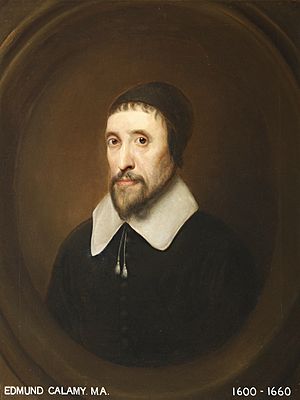Edmund Calamy the Elder facts for kids
Edmund Calamy (born February 1600, died 29 October 1666) was an important English Presbyterian church leader. He was known as "the elder" because he was the first of four generations of ministers in his family who didn't follow the main Church of England rules. These ministers were called nonconformists.
Contents
Early Life and Education
Edmund Calamy's family believed they came from Huguenots, who were French Protestants. He was born in London and went to Merchant Taylors' School. Later, he studied at Pembroke College, Cambridge. While at Cambridge, he disagreed with a religious idea called Arminianism, which meant he couldn't become a fellow (a senior member of the college).
However, Nicholas Felton, who was the Bishop of Ely, made Calamy his personal chaplain. He also gave Calamy a church job in Swaffham Prior, which he kept until 1626.
Moving to Bury St Edmunds
After Swaffham Prior, Calamy moved to Bury St Edmunds. He worked there as a lecturer for ten years. Another famous preacher, Jeremiah Burroughs, also worked in the town. Calamy left Bury St Edmunds because his bishop, Matthew Wren, wanted him to follow certain church ceremonies. Calamy refused to read a book called the Book of Sports in his church, which allowed sports on Sundays.
In 1636, he became a rector (a church leader) in Rochford in Essex, but he had to leave due to his health. In 1639, he was chosen to lead the church of St Mary Aldermanbury in London. He became very popular there and had many followers.
Leading the Presbyterians
When the Long Parliament started, Edmund Calamy became a strong supporter of the Presbyterian polity. This was a way of organizing the church where local leaders (called elders) had more power, rather than bishops. He helped write a famous book called Smectymnuus. This book argued against the ideas of Bishop Joseph Hall and explained the Presbyterian view.
The name Smectymnuus came from the first letters of the writers' names:
- Stephen Marshall
- Edmund Calamy
- Thomas Young
- Matthew Newcomen
- William Spurstow (W was often written as VV back then)
These men were key leaders of the Presbyterian movement within the Church of England. Calamy was also a very influential preacher. In December 1641, he called for more preaching throughout England.
Westminster Assembly and the Souldier's Pocket Bible
In 1643, Calamy became an active member of the Westminster Assembly. This was a group of religious leaders who met to discuss and reorganize the Church of England. In the same year, he helped create the Souldier's Pocket Bible. This was a popular collection of Bible verses made for the Parliament's soldiers.
Calamy and the other Smectymnuans did not support complete religious tolerance. In 1644, Calamy strongly argued for controlling independent religious thinkers. He found that Presbyterianism was a good middle ground for his religious beliefs and how the church should be run.
In 1647, he worked on the Assembly's Catechism, which is a set of questions and answers used to teach religious beliefs. In 1648, he was preaching at St Benet Fink when a Baptist minister named Edward Barber was invited to argue against him.
Calamy was against the execution of King Charles I. He lived quietly during the time when England was a republic, known as the Commonwealth. When Oliver Cromwell asked him for advice about ending the Parliament and setting up a new government, Calamy said that most people would be against it.
After the King Returned
Edmund Calamy worked hard to bring King Charles II of England back to the throne. He even traveled to the Netherlands as one of the people negotiating the king's return. After the Restoration in 1660, he was offered the important job of Bishop of Coventry and Lichfield, but he turned it down. Other Presbyterians had warned him that his good name would suffer if he accepted.
He became one of King Charles II's chaplains (religious advisors). He tried, but failed, to make the king's promise of 25 October 1660 a legal rule. This promise would have allowed some religious freedom. In 1662, he was forced to leave his church because he was a Nonconformist. This event was part of the Great Ejection, where many ministers were removed from their churches.
Calamy was deeply saddened by the terrible damage caused by the Great Fire of London. He died shortly after seeing the devastation. He was buried in the ruins of his church, near where the pulpit (the raised platform for preaching) used to be.
His Writings
Most of Edmund Calamy's published works are sermons (religious speeches). However, he also wrote:
- The Art of Divine Meditation (London: for Tho. Parkhurst, 1634)
- An Answer to a Book entitled, An Humble Remonstrance (1641) as part of Smectymnuus
- Gods Free Mercy to England (1642)
- Englands Looking-glasse (1642)
- Souldier's Pocket Bible (1643), which he edited (1895 reprint)
- Jus Divinum Ministerii Evangelici (1654)
- The Godly Man's Ark (1658)
Edmund Calamy the Younger
Edmund Calamy's oldest son was also named Edmund Calamy. He was known as "the Younger." He followed a religious path similar to his father's. He also lost his church job in Moreton, Essex during the Great Ejection of 1662. He was a quiet person with moderate views and passed away in 1685. He was the father of the famous historian Edmund Calamy.
 | Jessica Watkins |
 | Robert Henry Lawrence Jr. |
 | Mae Jemison |
 | Sian Proctor |
 | Guion Bluford |


